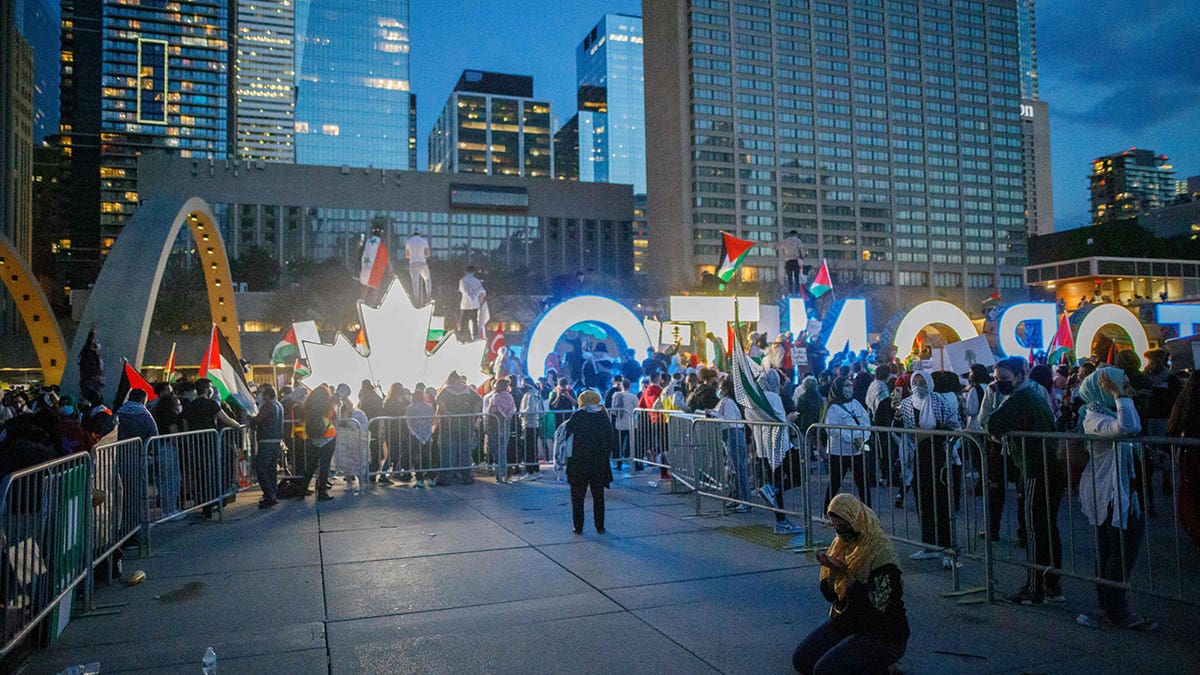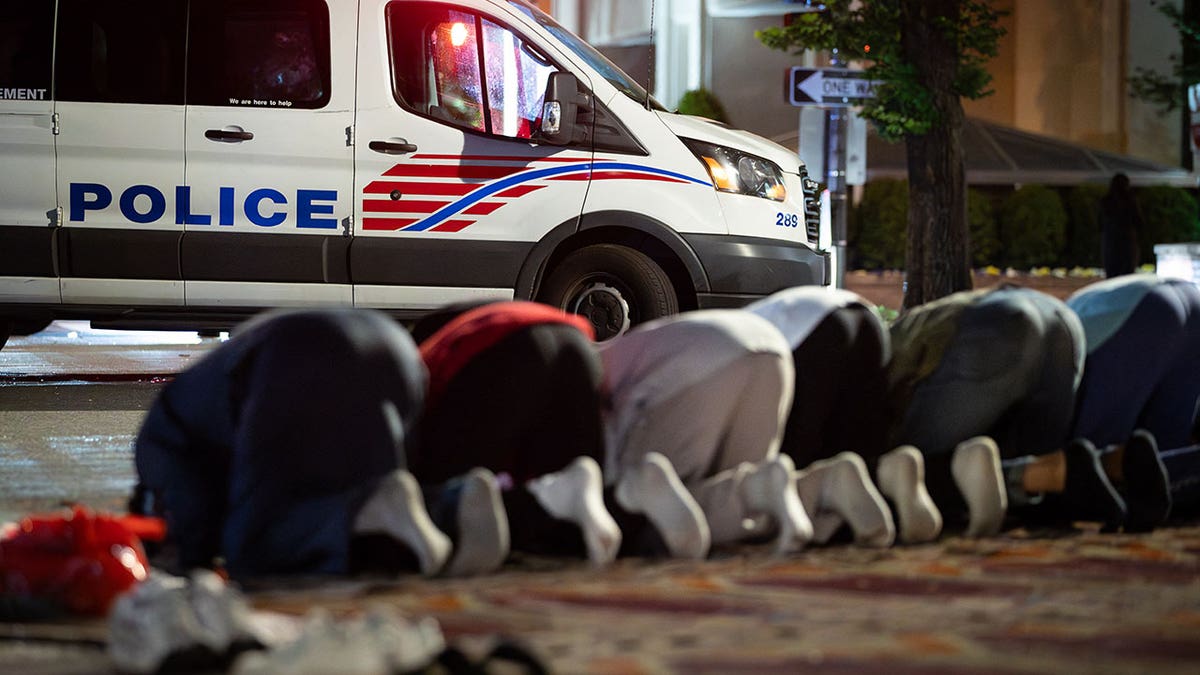

Late last month, Quebec Premier François Legault and Secularism Minister Jean-François Roberge announced that they will introduce a new law this fall to ban prayer in public spaces. The measure comes in response to what Roberge described as the "proliferation of street prayer" — a practice that has become synonymous with mass Islamist displays, particularly in the wake of pro-Hamas and pro-Palestinian demonstrations.
Street prayer is no longer the image of quiet devotion. From Toronto to Times Square, it is political theater, often conducted en masse, blocking roads, obstructing entrances and projecting intimidation into the heart of civic life.
Legault was blunt: "When you want to pray, you go in a church or a mosque— not in a public place." Roberge added that such practices generate unease, erode neutrality and risk public order.
The echoes of Bill 21, Quebec’s 2019 law banning public-sector workers from wearing religious symbols, are impossible to ignore. That earlier law asserted Quebec’s right to defend laïcité — or secularism, in French — with teeth. Now the province is extending the same logic to the streets.
Predictably, civil liberties organizations and establishment Muslim leaders have raised alarms. Based in Toronto, the Canadian Civil Liberties Association responded to the plans with a statement that a ban on public prayer collides head-on with protections of religion, expression and assembly in Canada’s Charter, a part of the country’s constitution. The Canadian Muslim Forum labeled the proposed law stigmatizing. And Montreal Archbishop Christian Lépine went so far as to claim that banning public prayer would be "like forbidding thought itself."

A woman prays in an enclosed area during a demonstration to voice support for the people of Palestine, at Toronto City Hall in Toronto, Ontario, Canada, on May 15, 2021. (Photo by Cole BURSTON / AFP)
The rhetoric is heavy, but it misses the core issue: Public prayer in this context is not an act of private conscience. It is a performance of power in shared civic space.
To say so is not "Islamophobic." It is Islamic. The Prophet Muhammad himself cautioned against praying in the middle of the road. One hadith, or saying of the prophet, in Sunan Ibn Majah records: "Beware of stopping to rest and praying in the middle of the road, for it is the refuge of snakes and carnivorous animals."
Beyond metaphor, the point is clear: Prayer must not endanger others or disrupt public order. Even Islamic law recognizes the folly of obstructing communal life with ritual performance. Quebec, in other words, is not contradicting Islam but upholding a principle embedded within it.

Muslim students pray at sunrise at a Gaza solidarity encampment at George Washington University, while a DC police van blocks the street, Washington, DC, April, 29, 2024.(Photo by ALLISON BAILEY/Middle East Images)
This is not the first time Islamists have sought to stretch the limits of accommodation. Public prayer in Western cities has increasingly been used as a form of political demonstration. It is no coincidence that these displays often coincide with "Free Palestine" rallies that slide easily into antisemitic chants and intimidation of Jewish communities. Outside synagogues and churches, on sidewalks and in squares, mass prayer becomes less about God and more about leverage — about showing who can claim the public square.
Voices within Muslim communities warn against this manipulation. Raheel Raza, a Canadian Muslim journalist and the cofounder of the Clarity Coalition, a network of Muslims, ex-Muslims and allies, challenging Islamist extremism, told me that she opposes religious practices imposed into civic life, from gender-segregated prayers in schools to Islamist infiltration of politics and street prayer.
Her argument is simple: faith is personal, not a tool for public coercion.
What is at stake here is more than legal balance. It is the cultural coherence of Quebec’s civic life — and the civic life of communities from New York City to London.
Similarly, Canadian Muslim commentator Mohammed Rizwan, a member of the Clarity Coalition, condemns the politicization of prayer in public spaces, calling it "a deliberate act to provoke and divide."
Their perspectives matter precisely because they refuse the false binary that criticism of Islamism is an attack on Islam It is the opposite: a defence of faith against those who weaponize it.
They also belie the reductionist allegation that all Muslims are Islamists in hiding.
The constitutional battle to come is inevitable. The Supreme Court’s 2015 decision in Mouvement laïque québécois v. Saguenay established that even municipal prayers violate the state’s duty of neutrality. Quebec is not forging a new path. It is following a jurisprudence that insists public institutions cannot privilege religious expression.
And, as with Bill 21, the government may well invoke the notwithstanding clause to shield this new law from Charter challenges. Critics will cry authoritarianism, but the real authoritarianism lies in the Islamists who claim the right to seize public streets for political theater under the guise of prayer.
What is at stake here is more than legal balance. It is the cultural coherence of Quebec’s civic life — and the civic life of communities from New York City to London.
Public spaces are the commons where neutrality must prevail. To surrender them to religious or ideological spectacle is to surrender the very idea of a shared civic realm. Secularism is not intolerance. It is the only principle that guarantees equal freedom for all, regardless of creed.
Quebec’s proposal, then, is not a ban on prayer. It is a defense of the public square. Prayer belongs in mosques, churches, synagogues and homes. The streets belong to everyone. In refusing to conflate religious devotion with political intimidation, Quebec is asserting a truth that is both secular and, paradoxically, Islamic: worship that obstructs and divides has no place in the civic realm.
This legislation will be polarizing. It will be challenged. But it will also draw a line — a line that says Canada, Quebec in particular, and, dare say, one day, the world, will not be cowed into letting Islamist street politics redefine our public life.
Laïcité is not just an idea. It is a shield. And Quebec is once again prepared to use it.
